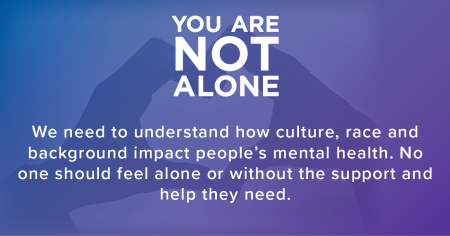Mental Health Stigma
Stigma and discrimination have caused so many of us to suffer. Let's break down stigma so no one struggles in silence.
Take the quiz to see if you’ve been affected by mental health stigma and/or Sign the Pledge to be stigma free
Millions of Americans face mental health obstacles in day-to-day living. Along with our partners at the UT Health SA Student Counseling Center, the Office for Undergraduate Medical Education’s (UME) Student Affairs team is committed to shedding light on mental health research, issues, and coping strategies. Our goal is to provide support and guidance to our campus community through resources on a variety of topics related to mental health.
Common Warning Signs of Mental Illness

Stigma and discrimination have caused so many of us to suffer. Let's break down stigma so no one struggles in silence.
Take the quiz to see if you’ve been affected by mental health stigma and/or Sign the Pledge to be stigma free
|
Instead of...
|
Try...
|
Our culture, beliefs, sexual identity, values, race and language all affect how we perceive and experience mental health conditions. Cultural differences can significantly influence what treatments, coping mechanisms and supports work for us. It is therefore essential for culture and identity to be a part of the conversation as we discuss both mental health and mental health care. Annually, mental illness affects:

Visit NAMI’s online Identity and Cultural Dimensions section for resources specific to these communities. In this documentary miniseries, NAMI explores unique perspectives on mental health from the Black, Hispanic/Latinx, Asian American/Pacific Islander and LGBTQI communities. Through candid and courageous stories of lived experience, these mental health champions share their journeys of resiliency and recovery.
In addition, the UT Health SA Office for Inclusion and Diversity has numerous other resources on Anti-Racism that can contribute to healthy mental states.
In the demanding field of health care, stressors are inevitable. From adjusting to unusual hours and extra shifts, to the trauma of losing patients — the job is not easy. The COVID-19 pandemic has created added layers of uncertainty and increased loss, along with deep concern for the well-being of yourself and your family. Now more than ever, those taking care of us on the frontlines need our support in return. Take a moment to review signs that indicate it’s time to consider asking for support, as well as a range of resources created especially for medical professionals. You’ll also find actionable tips on building resiliency, and ways for families to get involved.
“A number of barriers come from a mindset that physicians are supposed to be superhuman. Instead, we should be setting professional norms that medicine is an emotionally demanding profession and that it’s common at times to need help.”
Tait Shanafelt, MD
Chief Wellness Officer at Stanford Medicine
Caring for others requires that you also care for yourself. However, there are many concerns on the future of a career in medicine if mental health conditions are reported. See this article that answers many of your questions related to mental health reporting.
Concerns about getting a medical license should never keep you from seeking treatment for a mental or physical health diagnosis. Physicians with mental and physical health diagnoses can obtain a medical license in every state, but the process for doing so varies between states. States differ in how they ask about current versus historical diagnoses. How this information is handled also differs from state to state as listed on the application.
Yes. If you need to take a prolonged amount of medical leave that will affect your ability to complete educational requirements on time, you should talk with your Student Affairs’ Deans for guidance. Leave policies can be found in the Medical Student Handbook (Found in your class canvas page).
Non-profits / Advocacy Organizations
American Medical Association. Recognizing the stigma around doctors and other medical professionals talking about their mental health struggles, the AMA created a new policy that encourages state licensing boards to only ask about current mental health challenges rather than past instances that no longer impair their ability to practice.
American Academy of Family Physicians. The AAFP is working with other partners to combat stigmas surrounding mental health in the medical profession – specifically for practitioners – by creating awareness around this growing concern. The organization created the National Physician Suicide Awareness Day to help educate individuals on the seriousness of the problem.
American Foundation for Suicide Prevention. The AFSP offers a comprehensive guide on healthcare professional burnout, depression, and suicide prevention to help bring awareness to these issues and provide tools for supporting medical professionals before more serious concerns present themselves.